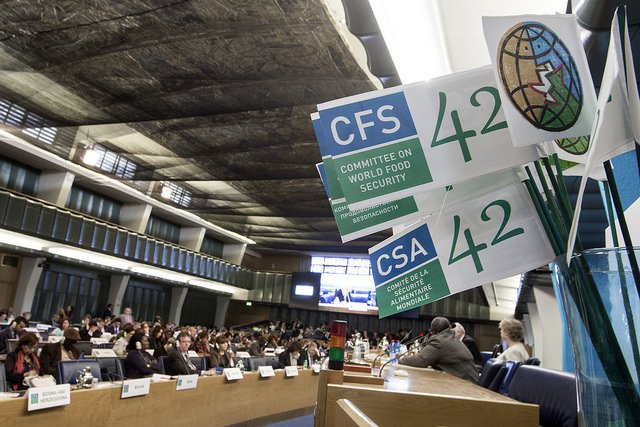Reflections from the Former Chair of the UN Committee on World Food Security
Last October, the 42nd Session of the Committee on World Food Security (CFS) marked a turning point for stakeholders working on the convergence and coordination of food security and nutrition policies worldwide. This conference, gathering more than 1100 multistakeholders from 129 countries and the first global conference on agriculture, food security and nutrition since the adoption of Agenda 2030 and the Sustainable Development Goals in NY on 25 September 2015, decided upon an important shift of CFS work for the years to come.
While nutrition was always included in the work of CFS as one of the four dimensions of food security, the new Sustainable Development Framework, the Second International Conference on Nutrition (ICN2 and increasing international momentum contributed to setting it as a higher priority on the CFS agenda in the years to come. This is much needed, considering the alarmingly high numbers of malnourished people – almost 1 out of 3 - as reported by the Global Nutrition Report 2015!
Last year, as Chair of CFS, I was a strong advocate of including multistakeholders, in particular civil society and the private sector, in the ICN2 negotiations leading to the Rome Declaration and the Framework for Action. As a result of ICN2, CFS 42 devoted considerable space to nutrition issues, with plenary sessions discussing CFS role in advancing nutrition; national multistakeholder approaches to improving nutrition and enhancing regional food supply systems to improve nutrition. These allowed stakeholders to share their experiences, opinions and shape future CFS work. CFS stakeholders have decided to launch a major workstream on nutrition for 2016-2017, supported technically by a wide range of nutrition-related UN agencies and stakeholders. Strengthening links and articulations, also advised by the GNR 2015, between all the various actors will be key : the world needs to hear about the benefits for nutrition of setting up multistakeholder platforms at country level, inter-agency collaboration such as within REACH, and positive impacts on accountability, advocacy, and results.

Photo credit: ©FAO/Alessandra Benedetti.
It has become clear to stakeholders that the CFS, as the foremost inclusive international and intergovernmental platform for all stakeholders to work together to improve global food security and nutrition policies, has a strong role to play in promoting nutrition. CFS can add great value to the joint efforts by gathering and connecting multistakeholders at all levels, providing a space for open and frank, evidence-based policy discussions, and sharing of examples of what works. Ensuring collaboration between all sectors and all stakeholders will be critical, if the variety of policy issues which contribute to progressing nutrition are to be addressed in a comprehensive way. This is the case, for example, for topics such as sustainable food systems, or nutrition-sensitive agriculture. The global fight against malnutrition in all its forms will not be won without addressing these complex issues in an inclusive way; CFS, through its previous work, for instance on responsible investment in agriculture and food systems, but also on food loss and waste in the context of sustainable food systems, water for food security and nutrition, or upcoming work on sustainable agriculture including livestock, offers many assets.
For CFS and my successor as Chair, the bulk of work on nutrition lies ahead. But I am proud to have been the Chair of this unique committee at a key moment in its history, and as many stakeholders who have been involved in the consolidation of the reformed CFS, I will continue to be a champion of multistakeholder, results based, transparent and accountable approaches to nutrition, for concrete results from local communities to the global level!
2030 should not only be the “zero-hunger generation”; but also the healthiest generation, supported by fully sustainable food systems!